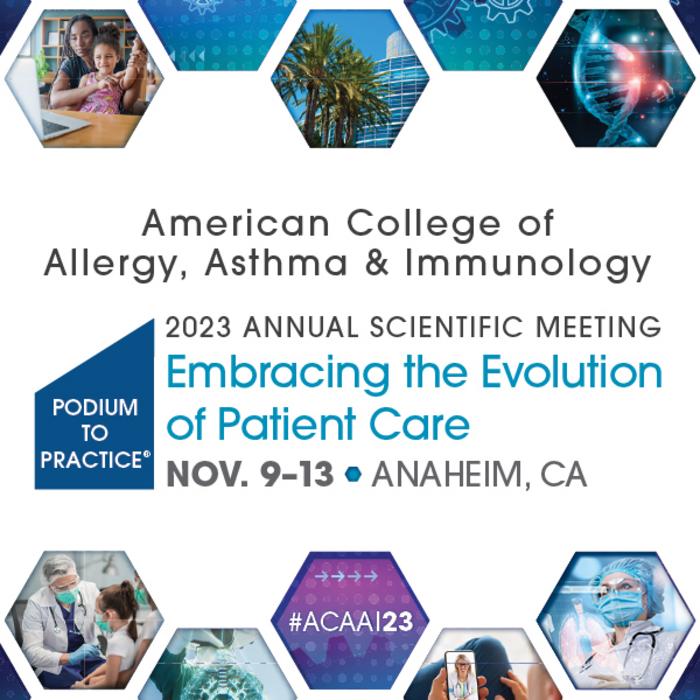ANAHEIM, Calif. (Nov. 9, 2023) – Biologics for the treatment of asthma were first introduced about 20 years ago. Since then, more and more people with asthma have found them to be an effective treatment in getting their symptoms under control. A new study being presented at this year’s American College of Allergy, Asthma and Immunology (ACAAI) Annual Scientific Meeting in Anaheim, Calif. shows that 42% of the primary care physicians (PCPs) surveyed were unfamiliar with asthma biologics. They didn’t know the criteria for starting them – including the need for lab work – and often waited until a patient had experienced two or more exacerbations in a year before referring to an asthma specialist.

Credit: ACAAI
ANAHEIM, Calif. (Nov. 9, 2023) – Biologics for the treatment of asthma were first introduced about 20 years ago. Since then, more and more people with asthma have found them to be an effective treatment in getting their symptoms under control. A new study being presented at this year’s American College of Allergy, Asthma and Immunology (ACAAI) Annual Scientific Meeting in Anaheim, Calif. shows that 42% of the primary care physicians (PCPs) surveyed were unfamiliar with asthma biologics. They didn’t know the criteria for starting them – including the need for lab work – and often waited until a patient had experienced two or more exacerbations in a year before referring to an asthma specialist.
“We know that many people who suffer from asthma are regularly seen by PCPs, and we wanted to know if PCPs were familiar with biologics to treat asthma,” said Bijalben Patel, MD, lead author of the study. “We also wanted to explore at what point PCPs were referring asthma patients with uncontrolled symptoms to asthma specialists, and whether they were aware of eligibility requirements for a patient to start biologic treatment.”
The survey was sent via email to primary care, attending and resident physicians in the departments of Internal Medicine, Family Medicine and Pediatrics. Of the 85 PCPs surveyed, 77% referred to specialists after two or more exacerbations per year, 42% were unfamiliar with biologics, 82% do not get labs, and 90% do not use absolute eosinophil count (a test for levels of a certain type of white blood cell that is active in allergic conditions) to guide management.
“The results of the survey point to the need to improve the communication between primary care physicians and asthma care specialists, including regarding use of biologics,” said allergist Juan Carlos Cardet, MD, MPH, ACAAI member and senior author of the study. “Biologics have become an important tool in the treatment of asthma and other allergic diseases such as atopic dermatitis (eczema), chronic rhinosinusitis with nasal polyps and eosinophilic esophagitis, and can prevent substantial ill results from occurring in patients who are eligible for them.”
The researchers also found the frequency of PCP referrals to a specialist did not change familiarity with biologics or eligibility criteria. PCPs who saw asthma patients more frequently and those who referred patients to specialists were more likely to get lab work to manage asthma.
Abstract Title: Primary care physician referral patterns and awareness of biologic therapy for uncontrolled asthma
Presenter: Bijalben Patel, MD
For more information about asthma and allergies, or to find an allergist in your area, visit AllergyandAsthmaRelief.org. The ACAAI Annual Scientific Meeting is Nov. 9-13. For more news and research from the ACAAI Scientific Meeting, go to our newsroom and follow the conversation on X/Twitter #ACAAI23.
About ACAAI
The American College of Allergy, Asthma & Immunology (ACAAI) is a professional medical organization of more than 6,000 allergists-immunologists and allied health professionals, headquartered in Arlington Heights, Ill. Founded in 1942, the College fosters a culture of collaboration and congeniality in which its members work together and with others toward the common goals of patient care, education, advocacy, and research. ACAAI allergists are board-certified physicians trained to diagnose allergies and asthma, administer immunotherapy, and provide patients with the best treatment outcomes. For more information and to find relief, visit AllergyandAsthmaRelief.org. Join us on Facebook, Pinterest, Instagram and Twitter/X.
PRIMARY CARE PHYSICIAN REFERRAL PATTERNS AND AWARENESS OF BIOLOGIC THERAPY FOR UNCONTROLLED ASTHMA
B. Patel*1, P. Bradford2, J. Cardet2, D. Ledford2, L. Guerra2, R. Plant2, K. Trasmonte2, P. Sriaroon3, B. Flam2, 1. Riverview, FL; 2. Tampa, FL; 3. St Petersburg, FL.
Introduction: Asthma is a common chronic airway disease causing more than 10,000,000 exacerbations per year in the US. Most patients with uncontrolled asthma are seen by primary care clinicians (PCP) and not by asthma care specialists who are trained in biologic therapy that is proven to decrease asthma exacerbation rates. Here we describe PCP referral patterns, their familiarity with biologic therapy, and their use of lab work in asthma management.
Methods: A REDCap survey was administered by email to primary care attending and resident physicians in the Departments of Internal Medicine, Family Medicine, and Pediatrics. Responses were compared using Chi-square tests.
Results: Of the 85 PCPs surveyed, 77% referred to specialists after 2+ exacerbations per year, 42% were unfamiliar with biologics, 82% do not get labs, and 90% do not use absolute eosinophil count to guide management. The proportion of PCPs unfamiliar with biologics (p=0.185) and their eligibility criteria (p=0.383) did not vary based on the number of asthma patients seen per month. Also, the frequency of PCP referrals to a specialist did not change familiarity with biologics (p=0.260) or eligibility criteria (p=0.393). PCPs who saw asthma patients more frequently and those who referred patients to specialists were more likely to get lab work to manage asthma (p=0.020 and p=0.029, respectively).
Conclusion: Most PCPs are unfamiliar with asthma biologics, their initiation criteria, including lab work, and often wait until 2+ exacerbations per year before referral to an asthma specialist. PCP education could increase access to biologic therapy and thus decrease asthma exacerbations in the US.
Journal
Annals of Allergy Asthma & Immunology
Method of Research
Survey
Subject of Research
Not applicable




